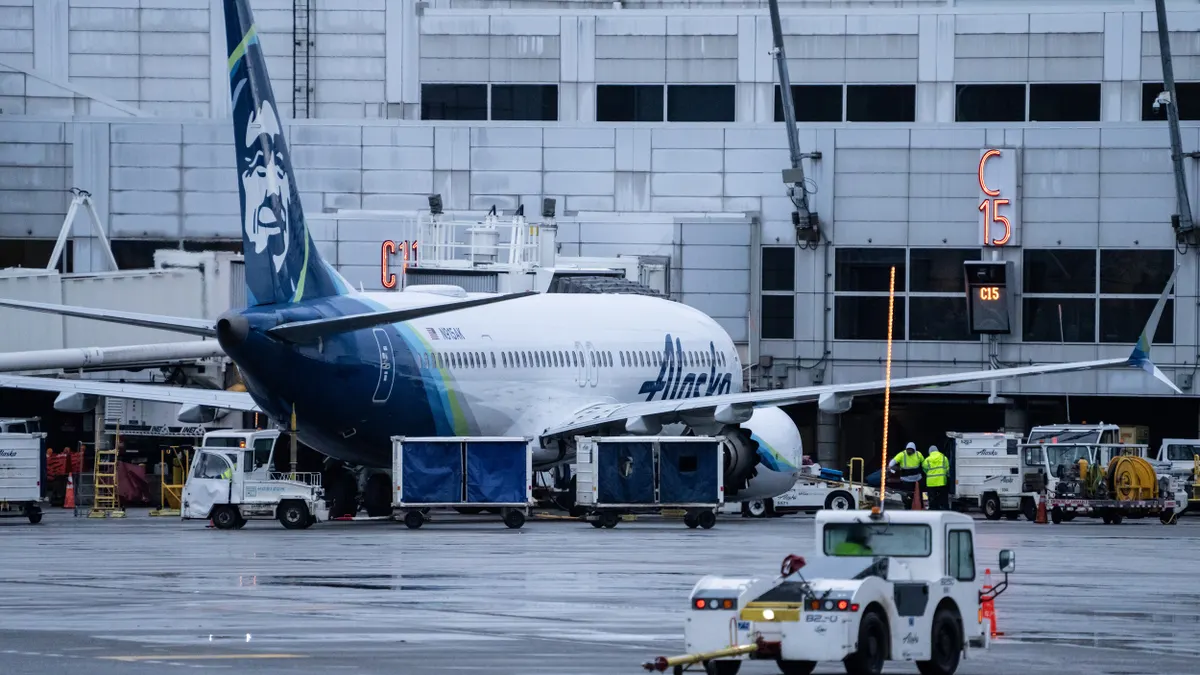Dive Brief:
- Boeing swiped former Lockheed Martin finance chief Jesus “Jay” Malave to serve as the jet maker’s next CFO, with Malave to succeed Brian West in the role effective Aug. 15, according to a Monday press release. Malave served a three-year term as Lockheed Martin’s finance chief, joining the defense manufacturer in January 2022 before departing from the position in April, according to his LinkedIn profile.
- The Arlington, Virginia-based company said West, who has served as its CFO since August 2021, will transition to the role of senior advisor to President and CEO Kelly Ortberg, also effective Aug. 15.
- “With Boeing making progress in our recovery, Brian and I believe this is the right time to hand the reins to a new leader as we embark on the next chapter of our company’s growth and development,” Ortberg said in an email to employees shared with CFO Dive. “Brian will continue as a senior advisor to me and oversee a smooth transition to Jay once he joins the company.”
Dive Insight:
The CFO swap comes after a rocky period for Boeing. Orberg termed the company’s past few years as “some of the most consequential in Boeing’s history,” crediting CFO West’s role for navigating its recovery efforts, according to the email.
West “successfully guided us through last year’s historic capital raise and ensured our team always had the resources to continue the critical work to strengthen safety and quality across our operations,” Ortberg said, referring to the approximately $22 billion raised by the company in an October 2024 stock sale. “I look forward to his continued counsel in his new role.”
Prior to Lockheed Martin, West’s successor Malave served as senior vice president and CFO for space and defense manufacturer L3Harris Technologies. Malave has also logged past experiences in the aerospace industry at United Technologies Corporation before its merger with Raytheon Technologies in 2020, as well as during an 11-year stint at aerospace component manufacturer Pratt & Whitney, according to his LinkedIn profile.
The CFO appointment marks the latest C-suite change at Boeing since Ortberg took its top executive seat last year, as five members of its executive team departed the company shortly after Ortberg took over, including its chief information officer and communications chief, Bloomberg reported at the time.
On Tuesday, Boeing also announced another executive shift, appointing company veteran Stephen Parker to the permanent role of president and CEO of its defense, space & security (BDS) business effective immediately, according to a press release. The move comes after Parker stepped into the seat on an interim basis in September 2024.
Malave will step into the top financial seat as Boeing continues to face both public and regulatory scrutiny in the wake of a series of plane crashes in recent years, as well as other headwinds stemming. After a door plug flew off an Alaska Airlines flight last year, the company came under heightened scrutiny from federal regulators. In June, federal investigators faulted Boeing for failing to provide adequate training and oversight for its manufacturing operations, which led to the incident, The Wall Street Journal reported.
Malave will join a C-suite tasked with both regaining public confidence as well as returning to profitability, after such incidents and a host of other challenges left the jet maker confronting severe financial setbacks. Last October, Ortberg announced the company would be laying off about 17,000 workers, as well as announcing its stock sale, both aimed at cutting down costs in the midst of a worsening liquidity crisis, AP News reported.
The moves came as the company was facing an ongoing strike of 33,000 machinists before reaching an agreement in November. The strike exacerbated already strained cash flow and production challenges. In the wake of the Alaska Airline incident, federal regulators put a cap on the production of Boeing 737s until they felt confident of its manufacturing safety guidelines, AP reported. The Federal Aviation Authority is not yet ready to lift that cap, its acting administrator said in early June according to a Reuters report.
In recent months, the jet maker has moved to regain some of its lost ground; for its most recent quarter ending March 31, Boeing narrowed its net loss attributable to shareholders to $37 million in the first quarter, compared to $343 million for the prior year period, according to its earnings report. The company also reported $19.5 billion in revenue, compared to $16.6 billion in the prior year period, according to its earnings results.
Boeing also released a 20-year forecast in June anticipating strong continued demand, with its global fleet projected to reach about 50,000 commercial aircraft by 2044, according to company releases.
However, the company’s safety record has drawn fresh scrutiny after an Air India flight on a London-bound Boeing 787-8 Dreamliner crashed less than a minute after takeoff on June 12, killing at least 270 people, the BBC reported.
“Our deepest condolences go out to the loved ones of the passengers and crew on board Air India Flight 171, as well as everyone affected in Ahmedabad,” CEO Ortberg said in a statement on the flight published by the company at the time. “I have spoken with Air India Chairman N. Chandrasekaran to offer our full support, and a Boeing team stands ready to support the investigation led by India’s Aircraft Accident Investigation Bureau.”














